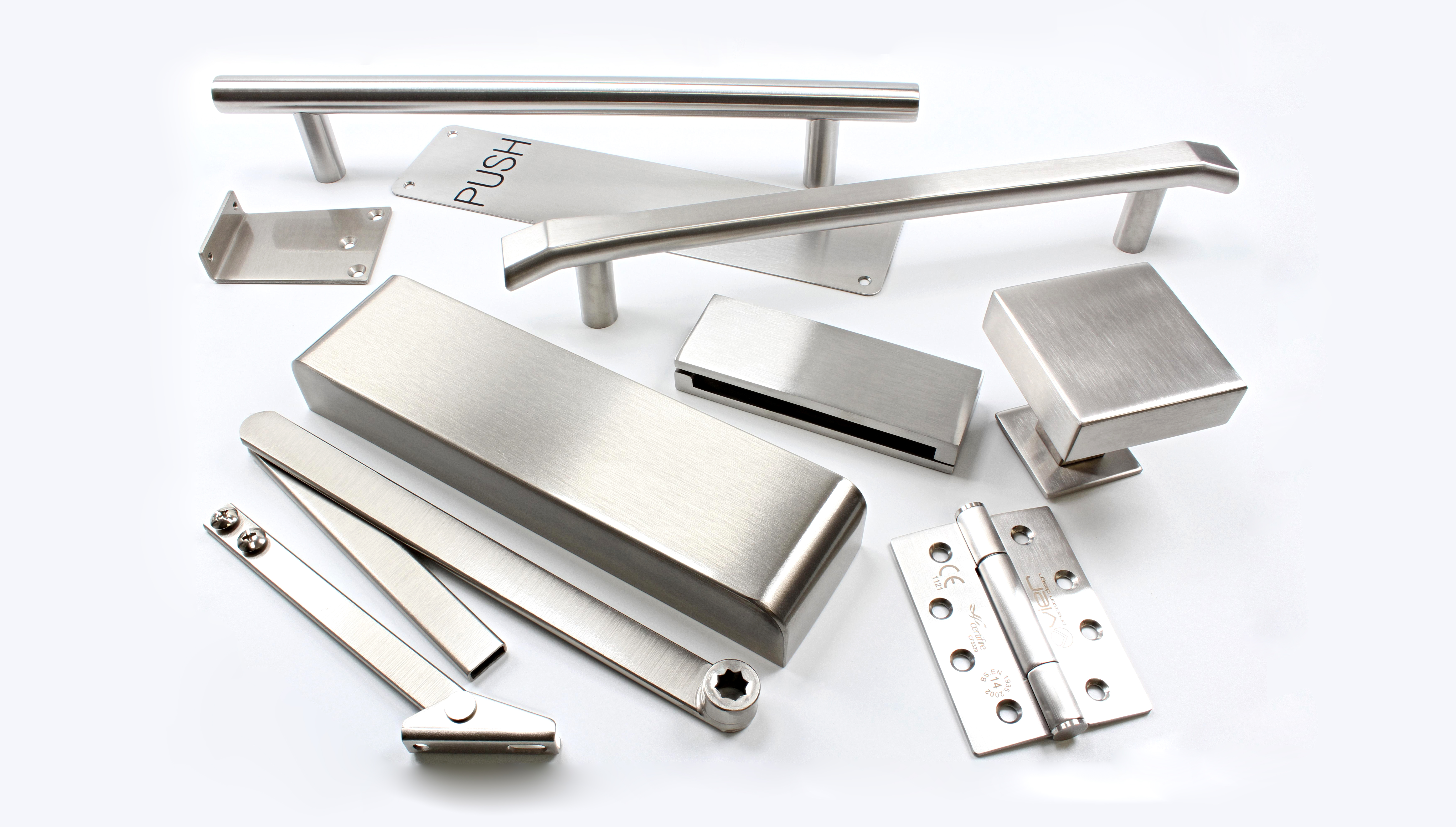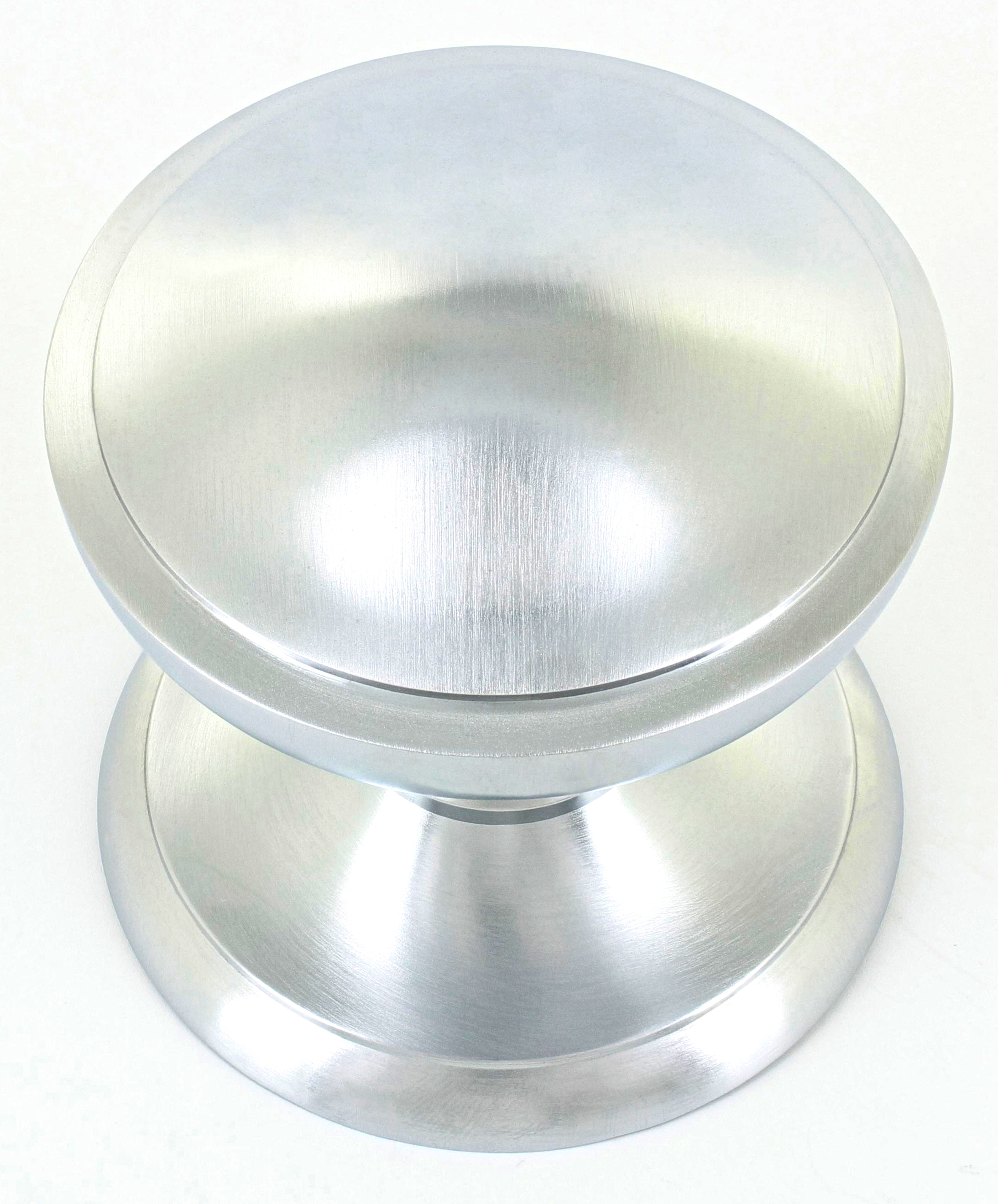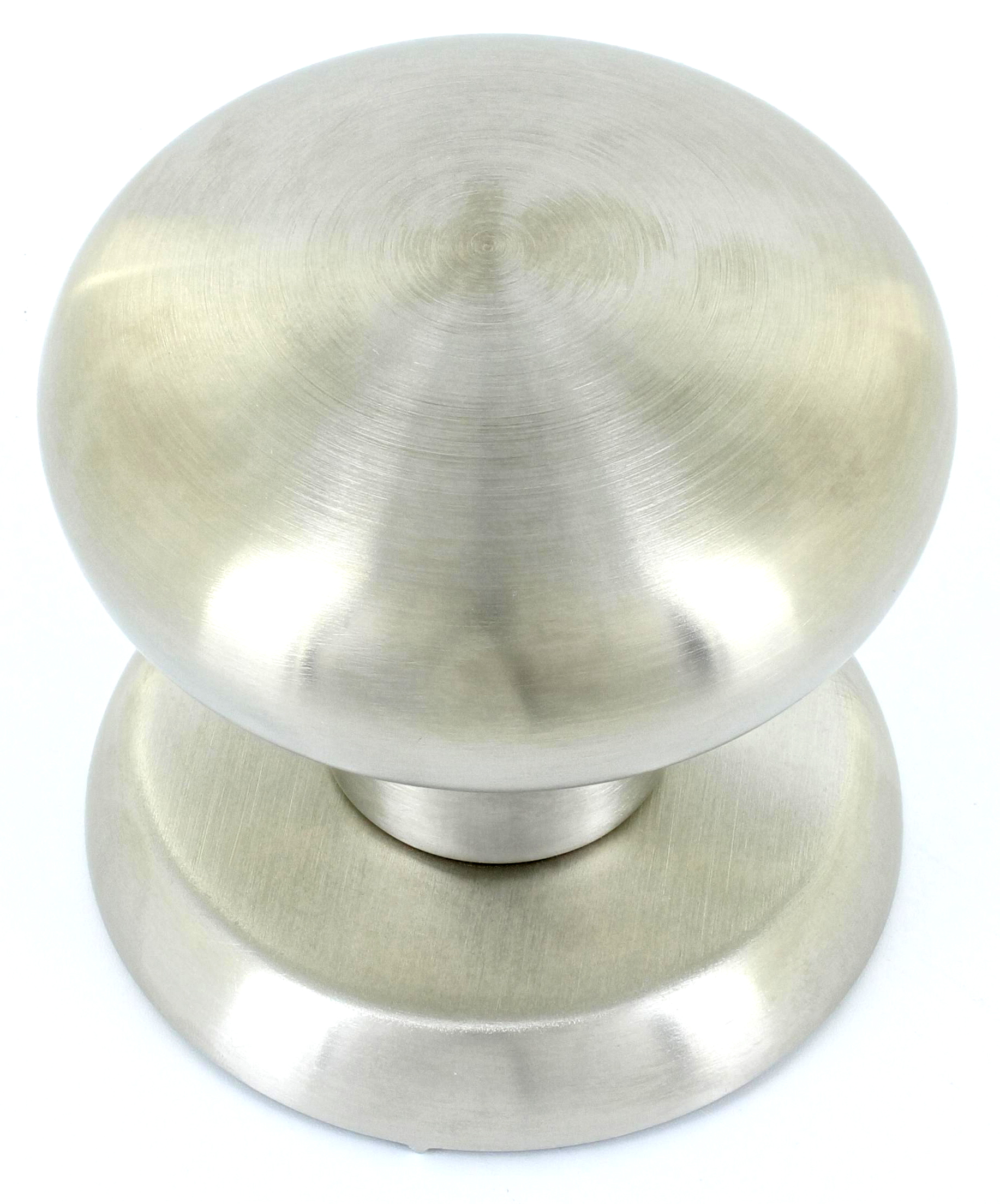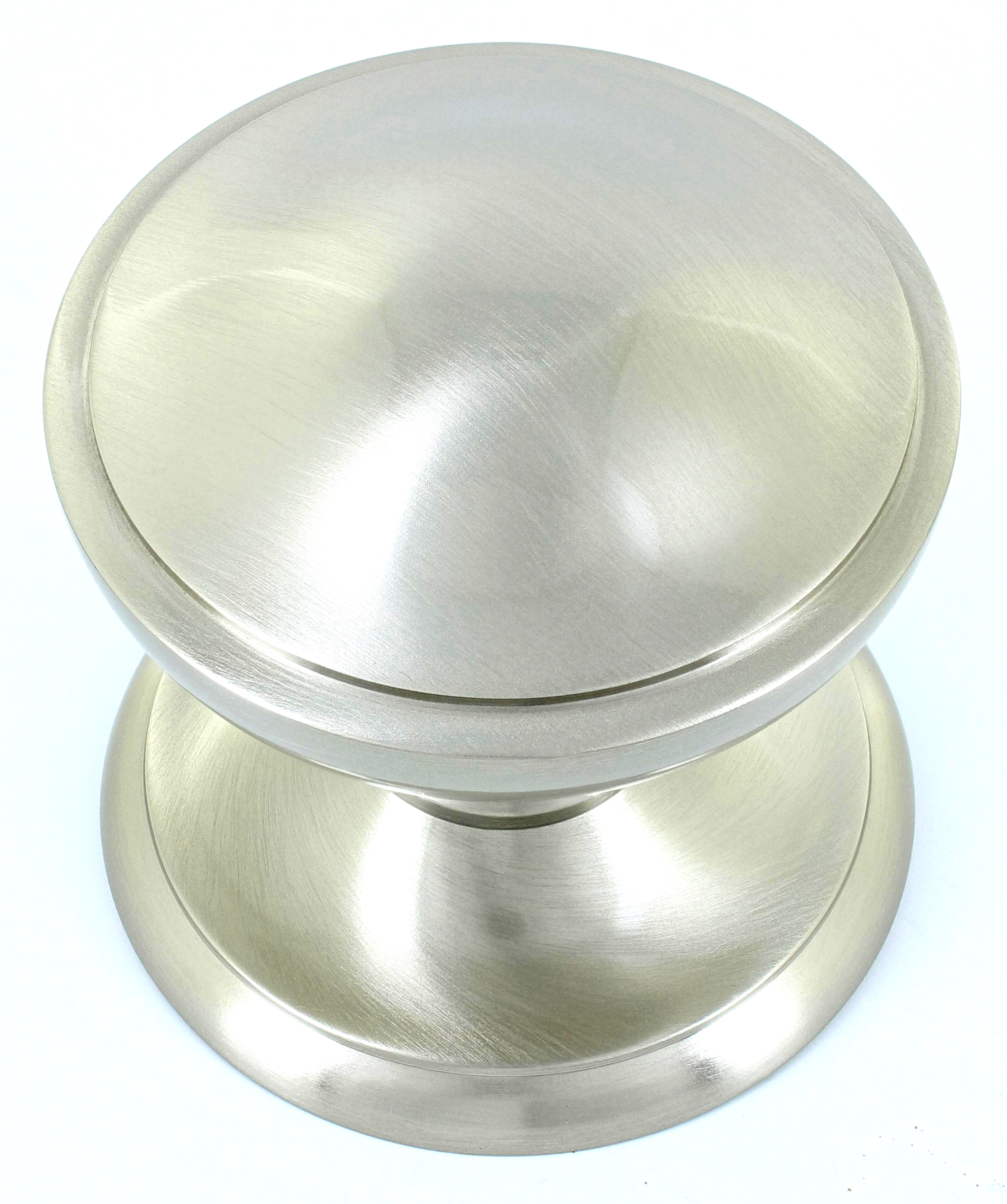Need Help? Contact Us Trade Customer? Register / Login
Satin Stainless Steel - (SSS)

What is Stainless Steel?
Stainless steel is the universal name for a number of different steels used primarily for their anti-corrosive element. “Stainless” is a term coined early in the development of these steels for cutlery applications. It was adopted as a generic name for these steels and now covers a wide range of steel types and grades for their corrosion or oxidation (rust) resistant applications.
Stainless steel differs from regular carbon based steel by adding the element Chromium. The addition of the element Chromium to regular steel is what gives the stainless steel its corrosion resistant properties. Other alloying elements such as Nickel and Molybdenum can also be added to the steel depending on the type and grade of stainless steel required.
Stainless steels contain sufficient Chromium to form a thin, transparent layer on the surface of the steel. This passive layer of Chromium Oxide protects the surface from corrosion, even if the material is scratched or damaged, as it instantaneously reforms in the presence of oxygen from air or water stopping the corrosion from spreading into the metal's internal structure.
What colour is Stainless Steel?
Satin Stainless Steel is a grey or silver colour but with very slightly golden undertones. Satin Stainless Steel has visible brush marks in its surface which adds to the character of the item.
All Satin Stainless Steel products will be the same colour, but due to the random process of satinising, different product ranges might have a very slightly different brushed pattern to them depending on how long and how hard they have been "brushed" for.
Are there any other colours similar to Satin Stainless Steel?
Yes, if you can’t find the item you are looking for in Satin Stainless Steel, the next closest finish is Satin Nickel followed by Satin Chrome



Satin Chrome SatinStainless Steel Satin Nickel
As you can see from the above images, Satin Stainless Steel is a grey colour with a very slight golden tint, Satin Nickel is a very close match having the same golden tint to it. While Satin Chrome is more of a grey colour with a blue tint.
Are there different grades of stainless steel?
Yes, there many different grades of stainless steel available, they vary depending on corrosion resistance and application required.
In the architectural ironmongery world the three most common grades of stainless steel used are:
- Grade 316
- Grade 304
- Grade 430
Grade 316 stainless steel is commonly known as marine grade stainless steel due to its high corrosion resistance. Grade 316 owes its high corrosion resistance to the addition of the element Molybdenum and is suitable for use in aggressive atmospheres such as coastal areas and swimming pools. Grade 316 stainless steel is non-magnetisable
Grade 304 tends to be the most versatile and widely used grades of stainless steel, its chemical composition, mechanical properties, weld-ability and corrosion / oxidation resistance provide the best all-round performance stainless steel at a relatively low cost. Grade 304 is suitable for internal and external use and is non-magnetisable.
Grade 430 has a lower corrosion resistance then the above two grades due to the lower chromium and nickel content in the steel thus making it cheaper to produce. Grade 430 is still more then suitable and corrosion resistant for internal or external use, but when fitted externally may require more regular cleaning to remove dirt and water marks from the surface of the material to help prevent small signs of oxidation forming. Grade 430 is easily distinguishable from 304 and 316 as it is magnetisable.
How is the Satin finish produced?
The raw unfinished stainless steel is sent through a machine to be satinised, (brushed) this process produces very fine lines or “brush marks” in the surface of the material to give it its satin finish. Satin Stainless Steel is not a plated or an applied finish it is simply a satinisied raw material.
Are all Satin Stainless Steel items the same colour?
Yes all Satin Stainless Steel products will be the same colour, but due to the random process of satinising, different product ranges might have a very slightly different brushed pattern to them depending on how long and how hard they have been "brushed" for.
Are Satin Stainless Steel products suitable for outside use?
Yes, as we mentioned before stainless steel is protected from corrosion by a thin layer of Chromium Oxide. Oxygen from the atmosphere combines with the chromium in the stainless steel to form a passive Chromium Oxide film. When the stainless steel is scratched the Oxygen and Chromium react again to re-seal the protective layer and protect the stainless steel from further corrosion. This protective film makes stainless steel products ideal for outside use where they will be exposed to the wind, rain and general dirt.
However, there are deposits especially in the outside air which can influence the corrosion resistance (e.g. marine atmospheres, industrial pollution, salt spray from road de-icing salt, atmospheric dirt and acid rain). These deposits if left on the surface of the stainless steel and are not cleaned off can start to break down small areas of the “self-healing” protective layer, affecting the corrosion resistance. If left long enough they can even result in very small areas of rust to start forming.
Thus some form of routine cleaning is necessary to preserve the appearance and integrity of the surface. Stainless steels are easily cleaned by many different methods. They actually thrive with frequent cleaning and, unlike some other materials, it is impossible to 'wear out' stainless steel by excessive cleaning. Stainless Steel performs best when clean - cleanliness is essential for maximum resistance to corrosion.
How to clean and maintain Satin Stainless Steel products?
Particularly for stainless steel items fitted externally, surfaces should be wiped over with a clean cloth and warm water with a mild detergent, on a frequent and routine basis to remove any dirt and deposits that may have built up over time.
Carbon steel brushes and steel wool should be avoided as they may leave particles embedded in the surface, which can lead to rusting.
For stainless steel items fitted in harsh or exposed environments we sell a stainless steel cleaner, that helps removes dirt and deposits, as well as helping to maintain the protective layer of Chromium Oxide on the surface of the stainless steel.
Regular cleaning will keep the appearance of the stainless steel looking as good as new and will help keep the corrosion resistance of stainless steel in an excellent condition.
Is Chrome and Stainless Steel the same?
No, although visually the two finishes can appear to be very similar stainless steel is actually tougher and more durable than chrome. This is why Stainless Steel is often used in commercial or industrial buildings while chrome may be used in residential property.
Our Top Satin Stainless Steel Products
- Tubular Design Casement Window Stay - Available In Two Sizes - Grade 316 - Satin Stainless Steel
- Lift Handle To Lock - Accessible Roller Lock & Handle Set For Disabled WC Toilets - Satin Stainless Steel
- Lever Action Flush Bolts - Suitable For Use On FD30 / FD60 Fire Doors - Satin Stainless Steel
- FB2 London Fire Brigade Dead Lock - FD30 / FD60 Fire Rated - CE Marked - Satin Stainless Steel
- Rectangular Flush Pull Handle With Finger Grip Section - For Sliding Or Hinged Doors - 125mm x 83mm - Satin Stainless Steel
